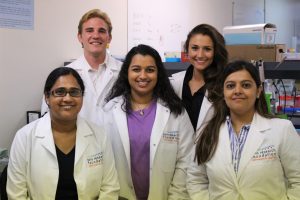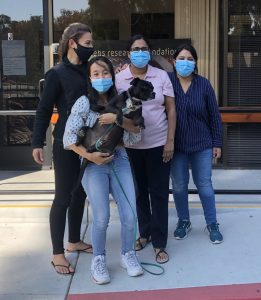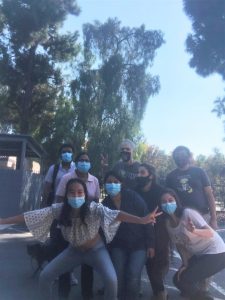Research Info
Mitochondria perform and support several vital functions in a cell, and the alternate genome, mtDNA, plays a critical role in organelle maintenance. There is increasing evidence that mitochondrial function declines with age, and that dysfunctional mitochondria adversely contribute to several metabolic and neuromuscular diseases. Our goal is to address age-acquired and inborn errors of mutation in the mtDNA using a gene therapy approach. We are exploring:
- allotopic expression (expressing mtDNA genes from the nucleus), and
- whole-organelle replacement
as strategies to revitalize mitochondrial function. Our multidisciplinary approach employs cell culture and mouse models to achieve our objectives.
Allotopic Expression of Proteins Encoded in the Mitochondrial DNA
Mitochondria are the ‘power plants’ in every mammalian cell responsible for the efficient conversion of nutrients to energy. Impaired mitochondrial function and mutations in mtDNA contribute to several age-related illnesses, including Alzheimer’s Disease, Parkinson’s disease, and sarcopenia. Point mutations in any of the 13 protein-coding regions, as well as micro- and macro- deletions in the mtDNA, lead to several monogenic and organelle-specific diseases (MELAS, MEERF, LHON, Leigh’s disease to name a few). However, alterations in the OriH / OriL regions in the mtDNA can lead to global impairment in the transcription and translation of the mitochondrial genome. The mitochondrial proteome, however, consists of ~1400 proteins of which all except for the 13 polypeptides translated on the mitochondrial genome originate from the host’ nucleus. Over the course of evolution, mitochondria have developed sophisticated mechanisms to import these nuclear mitochondrial proteins. These mechanisms employ intricate translocases and signals, which are directed to different regions within the organelle.
The goal of this project is to determine how we might achieve optimal parameters for coding and non-coding regions to efficiently express and target the 13 mtDNA genes to the respiratory chain from the nucleus. Toward this end, we employ molecular biology, biochemistry and computational strategies, and refine and build on our existing knowledge of import conditions for the numerous nuclear mitochondrial proteins already delineated. We use patient-derived cybrids and animal models in assessing the functional utility of our constructs. Ultimately, we aim to express the mtDNA genes individually or in combination to overcome age-related changes to the mtDNA and improve overall organelle fitness. Please see here for recent progress on this project.
Previous
Next
Reversing Age-Induced Mitochondrial Damage through Organelle Transplantation
Intercellular mitochondria exchange occurs naturally in the human body between cell types, typically between healthy and damaged cells. Three different transfer mechanisms have been observed:
- stem cells release naked mitochondria that are taken up by other cells,
- mitochondria are released extracellularly, enclosed in vesicles that are in turn taken up by recipient cells (possibly via endocytosis), or
- mitochondria migrate from one cell to another through specialized structures in vivo, such as nanotubes.
The goal of this project is to evaluate the potential of mitochondrial transfer to counteract age-related loss of tissue function. We aim to develop strategies to purify viable mitochondria and deliver them to target regions in the body.
Team Members
We’re Hiring!
Please visit the Work With Us page to learn about available positions.

Amutha Boominathan, PhD
Principal Investigator

Bhavna Dixit, MS (Research Associate II)
Research Staff

David Begelman, BS (Research Associate I)
Research Staff

Carly Truong, BS (Research Technician)
Research Staff

Jay-Miguel Fonticella (Class of 2022, Tufts University, BS)
Summer Scholar

Emily Wallace (Class of 2024, U Mich. BSE)
Summer Scholar
Lab Alumni
Research Staff
- Jayanthi Vengalam (2012-2015) – now at Protagonist Therapeutics
- Shon Vanhoozer (2014-2017)
- Kathleen Powers (2015-2017) – now at Bristol Myers Squibb
- Caitlin Lewis (2017-2021) – now at SENS Research Foundation CSO Team
Summer Scholars and Postbaccalaureate Fellows
- Ali Crampton (Summer Scholar, 2012; Summer Scholar, 2013) – continued to Graduate School, University of Minnesota
- Summer Wang (Summer Scholar, 2014) – continued to Graduate School, Columbia University
- Natalie Friedricks (Summer Scholar, 2015) – continued to Medical School, University of Southern California
- Elizabeth Batiuk (Summer Scholar, 2016) – continued to Medical School, University of Portland
- Jasmine Zhao (Summer Scholar, 2017) – continued to Medical School, University of Southern California
- Michaela Copp (Summer Scholar, 2017) – continued to Graduate School, University of North Carolina
- Martina Velichkovska (Summer Scholar, 2018) – continued to Graduate School, University of California, Berkeley
- Carter Hall (Postbaccalaureate Fellow, 2018-2019) – continued to MS Health Administration, University of Alabama
- Sanjana Saravanan (Summer Scholar, 2019; Postbaccalaureate Fellow, 2019-2020) – continued to research at Stanford University
- Nana Anti (Postbaccalaureate Fellow, 2019-2020) – continued to Medical School, Loma Linda University
- Aly Ung (Summer Scholar, 2020)
- Carly Truong (Postbaccalaureate Fellow, 2020-2021) – continued to research here in the Boominathan lab
- Lauren Kirk (Postbaccalaureate Fellow, 2020-2021) – continued to research at University of Pennsylvania
Collaborators
Publications
- Dixit B, Vanhoozer S, Anti NA, O’Connor M S, Boominathan A. Rapid enrichment of mitochondria from mammalian cell cultures using digitonin. 2021 MethodsX, 8. https://doi.org/10.1016/j.mex.2020.101197
- Lewis CJ, Dixit B, Batiuk E, Hall CJ, O’Connor MS, Boominathan A. Codon optimization is an essential parameter for the efficient allotopic expression of mtDNA genes. Redox Biol. 2020 Feb;30:101429. doi: 10.1016/j.redox.2020.101429. Epub 2020 Jan 11. PMID: 31981894; PMCID: PMC6976934.
- Boominathan A, Vanhoozer S, Basisty N, Powers K, Crampton AL, Wang X, Friedricks N, Schilling B, Brand MD, O’Connor MS. Stable nuclear expression of ATP8 and ATP6 genes rescues a mtDNA Complex V null mutant. Nucleic Acids Res. 2016 Nov 2;44(19):9342-9357. doi: 10.1093/nar/gkw756. Epub 2016 Sep 4. PMID: 27596602; PMCID: PMC5100594.
Photos



Funding
To support our work please consider making a donation to SENS Research Foundation!
Thanks to our existing funders:




The Foster Foundation


